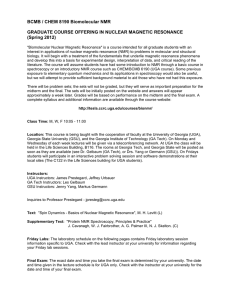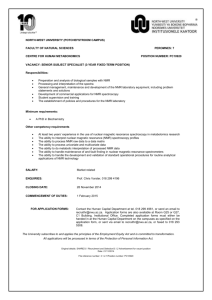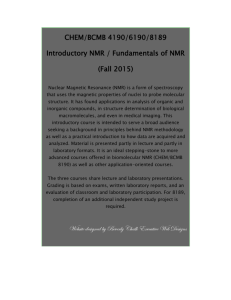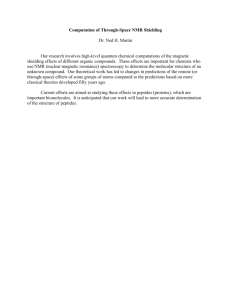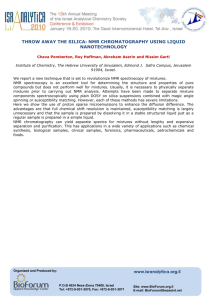Course Syllabus - Prestegard's Lab at the CCRC
advertisement
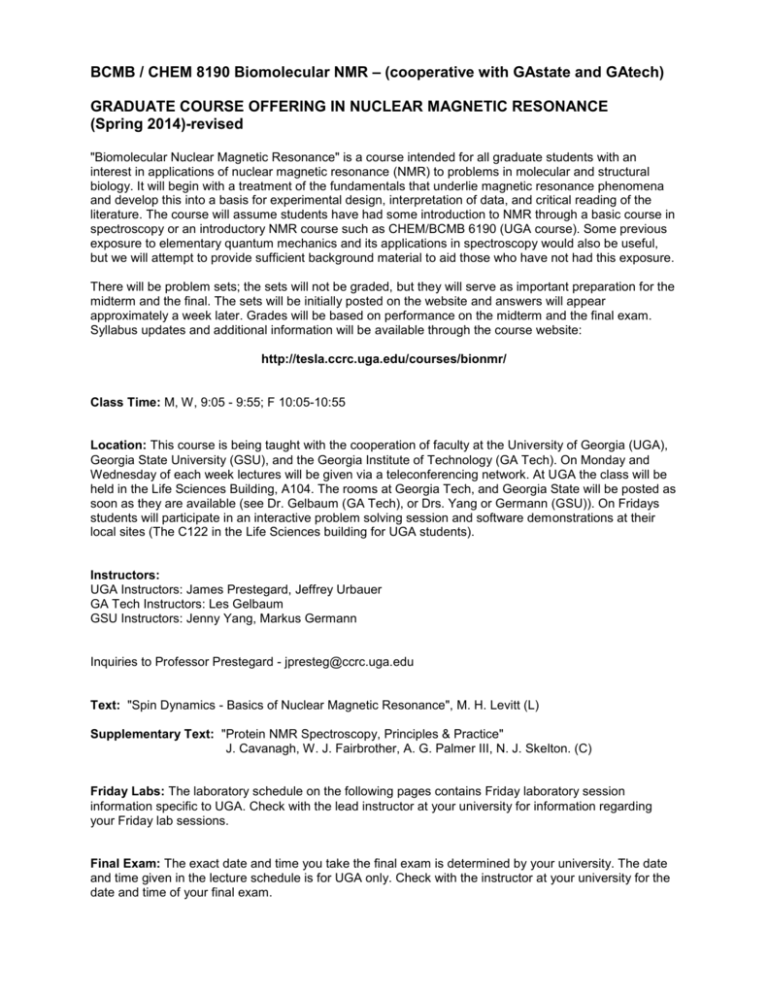
BCMB / CHEM 8190 Biomolecular NMR – (cooperative with GAstate and GAtech) GRADUATE COURSE OFFERING IN NUCLEAR MAGNETIC RESONANCE (Spring 2014)-revised "Biomolecular Nuclear Magnetic Resonance" is a course intended for all graduate students with an interest in applications of nuclear magnetic resonance (NMR) to problems in molecular and structural biology. It will begin with a treatment of the fundamentals that underlie magnetic resonance phenomena and develop this into a basis for experimental design, interpretation of data, and critical reading of the literature. The course will assume students have had some introduction to NMR through a basic course in spectroscopy or an introductory NMR course such as CHEM/BCMB 6190 (UGA course). Some previous exposure to elementary quantum mechanics and its applications in spectroscopy would also be useful, but we will attempt to provide sufficient background material to aid those who have not had this exposure. There will be problem sets; the sets will not be graded, but they will serve as important preparation for the midterm and the final. The sets will be initially posted on the website and answers will appear approximately a week later. Grades will be based on performance on the midterm and the final exam. Syllabus updates and additional information will be available through the course website: http://tesla.ccrc.uga.edu/courses/bionmr/ Class Time: M, W, 9:05 - 9:55; F 10:05-10:55 Location: This course is being taught with the cooperation of faculty at the University of Georgia (UGA), Georgia State University (GSU), and the Georgia Institute of Technology (GA Tech). On Monday and Wednesday of each week lectures will be given via a teleconferencing network. At UGA the class will be held in the Life Sciences Building, A104. The rooms at Georgia Tech, and Georgia State will be posted as soon as they are available (see Dr. Gelbaum (GA Tech), or Drs. Yang or Germann (GSU)). On Fridays students will participate in an interactive problem solving session and software demonstrations at their local sites (The C122 in the Life Sciences building for UGA students). Instructors: UGA Instructors: James Prestegard, Jeffrey Urbauer GA Tech Instructors: Les Gelbaum GSU Instructors: Jenny Yang, Markus Germann Inquiries to Professor Prestegard - jpresteg@ccrc.uga.edu Text: "Spin Dynamics - Basics of Nuclear Magnetic Resonance", M. H. Levitt (L) Supplementary Text: "Protein NMR Spectroscopy, Principles & Practice" J. Cavanagh, W. J. Fairbrother, A. G. Palmer III, N. J. Skelton. (C) Friday Labs: The laboratory schedule on the following pages contains Friday laboratory session information specific to UGA. Check with the lead instructor at your university for information regarding your Friday lab sessions. Final Exam: The exact date and time you take the final exam is determined by your university. The date and time given in the lecture schedule is for UGA only. Check with the instructor at your university for the date and time of your final exam. Lecture Schedule Date Instructor Topic Suggested Reading I. Introduction M 1/6 Prestegard A. Magnetic properties of nuclei and electrons - precession 5-38 L* W 1/8 Prestegard B. RF pulses and spin relaxation - Bloch equations 39-50 L*, 653 L* A. Instrumental considerations - a look at probes 65-76L* B. Fourier transform methods and data Processing 85-102 L* II. Instrumentation M 1/13 Prestegard W 1/15 Prestegard M 1/20 MLK Jr. Holiday (no class) III. NMR observables – Classical and Quantum Descriptions W 1/22 Prestegard A. Scalar Couplings 217-223 L* M 1/27 Prestegard B. Chemical Shifts 195-206 L* W 1/29 Prestegard C. Introduction to a QM description of NMR 171 – 194 L* M 2/3 Prestegard D. Applications to second order spectra 615-623 L* IV. Density Matrices and Product Operator Formalism W 2/5 Prestegard A. Density Matrix – Evolution and interpretation 259-289 L*, 369-381 L* M 2/10 Prestegard B. Density matrix in Product Operator Form 381 – 405 L* W 2/12 Prestegard C. 2D Heteronuclear Correlation 105-113 L*, 436-443 L*, 410-447 C M 2/17 Prestegard D. COSY, TOCSY 409-418 L*, 492-506 L* V. Basic Pulse Sequences and structural data W 2/19 Prestegard A. Pulsed field gradients and extensions to 3D 649-652 L*, 114 L* M 2/24 Urbauer B. Triple resonance experiments for proteins 468-530 C W 2/26 Urbauer C. Sequential assignment strategies in proteins 533-543 C M 3/3 Prestegard D. Spin relaxation and NOEs 543-576 L* W 3/5 Pederson E. Residual Dipolar Coupling 443-454 L* VI. Applications I M 3/10 Spring break – no class W 3/12 Spring break – no class M 3/17 Prestegard A. Spin relaxation in proteins W 3/19 Germann B. NMR of RNA and DNA I M 3/24 Yang C. Chemical Exchange and diffusion 584-593 L*, 306-308 L* 515 – 524 L* W 3/26 Yang D. Protein folding and amide exchange M 3/31 German E. NMR of RNA and DNA II W 4/2 Urbauer F. Structure determination protocols M 4/7 Prestegard G. Imaging (MRI) W 4/9 Prestegard H. in vivo spectroscopy (MRS) 543-554 C 309-315 L* VIII. Applications II M 4/14 Prestegard A Sensitivity Enhancement by Polarization Transfer W 4/16 Prestegard B. Drug discovery, SAR by NMR, STD, Tr-NOEs M 4/21 Prestegard C. Paramagnetic Effects W 4/23 Prestegard D. Solids NMR M 4/28 E. Review – self-study – email questions F 5/2 FINAL EXAM (8:00 – 11:00) UGA 211-217 L* Laboratory Schedule Date Instructor Topic F 1/10 Prestegard Computer set-up and LINUX Tutorial F 1/17 Prestegard Classical Simulations of NMR Experiments with PjNMR F 1/24 Urbauer Intro to data processing, weighting functions – MNova F 1/31 Urbauer Advanced data processing NMR PIPE Intro to Macros F 2/7 Urbauer Data display using NMR Draw F 2/14 Prestegard Introduction to a general analysis tool: Maple F 2/21 Prestegard Product Operator manipulations using Maple ----- midterm exam - no lab session ------- F 2/28 F 3/7 Prestegard Analysis of RDCs - REDCAT Spring break – (no class) F 3/14 F 3/21 Urbauer Assignments using NMR View F 3/28 Urbauer Assignments using NMR View II F 4/4 Urbauer Structure Calculation with CNS F 4/11 Urbauer Structure Calculation with CNS II F 4/18 Prestegard Ligand docking with HADDOCK F 4/25 Prestegard Makeup session (2nd order simulations?)
